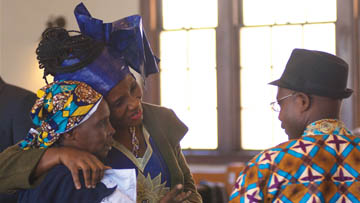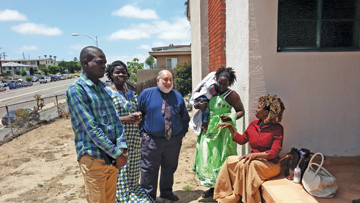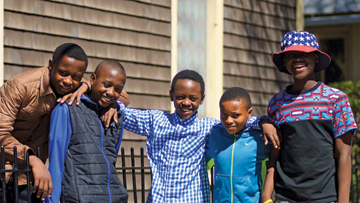You have free articles remaining this month.
Subscribe to the RP Witness for full access to new articles and the complete archives.
The experience of the New Testament Church began at Pentecost when many people heard the gospel in their native tongue. As those diverse peoples left Jerusalem following the miraculous event, many of them took the gospel home and planted churches that preached in new places and tongues.
Today’s international refugee crisis creates a situation similar to that faced in 1st Century Jerusalem. From coast to coast in the U.S. and Canada, the nations of the world are coming to our communities. This is not only true of large cities such as New York, Chicago, Los Angeles, and Toronto, but also of many smaller communities.
The Home Mission Board would like to encourage congregations to think about how you can be involved in ministry to refugees and others coming to our lands. Many peoples will come. Many will return to their home countries.
The home mission work that invests in those who come may result in the Global Mission Board seeing churches planted in nations where Reformed Presbyterians have never gone. This is an exciting prospect. Since this work is happening from coast to coast in the RPCNA, the Home Mission Board interviewed two coastal pastors on their work in refugee ministry: Pastor Daniel Howe (Christ [Providence, R.I.] RPC) and Pastor Mark England (San Diego, Calif., RPC).
How has God used your congregation for refugee ministry in the past five years?
Howe: Christ RPC has been home to approximately 60 refugees and immigrants from Congo, Burundi, and Rwanda. Currently we have 28 members and approximately 20 adherents from these places. We have an active ministry of mercy, working in concert with the local refugee resettlement agency and government resources. More than this, we rejoice that we are not a church with a refugee ministry so much as a church that is partly composed of refugees. Our congregation is half African and half Anglo-American on a given Sunday. We provide simultaneous Swahili translation of the service and (right now) a Swahili membership class.
England: We currently have three Ethiopian families worshiping with us, totaling 6 adults and 14 children. Also, we have another attendee whose situation requires silence. The national/ethnic breakdown of attendees is 20 Ethiopians, 5 Japanese, 7 Hispanics, 8 African-Americans, and 23 Caucasians.
What have the challenges been for refugee ministry?
Howe: We are challenged by language and culture—the usual. Refugees sometimes have different expectations for pastoral ministry, and we’ve had to discover how to talk when we have different ways of communicating (indirect vs. direct).
England: Several challenges include language barriers, adaptation to American culture, and the expectations of children in worship. Financial issues have been minimal.
What have been the greatest blessings from refugee ministry?
Howe: Too many to list. Refugee ministry has given us an insight into the Bible that we otherwise couldn’t have had. It has required genuine hospitality. It brings out the power of Christ’s love because this love, not cultural similarities, is what brings us together. Refugee ministry puts service at the heart of our church. It displays the gospel.
England: My congregation has gained a greater sense of participation in the Great Commission. It has increased our prayers for Christians and others in different and difficult parts of the world and given us the joy of being able to help people adapt to a peaceful new home. We’ve discovered the pleasure of joining in the spiritual life and growth of brothers and sisters from other cultures. The Lord has demonstrated to us that His church is bigger than we think, and that it is not coterminous with Western or American Christianity.
Could you share a story of Christ’s work that will encourage our readers to consider this ministry?
Howe: At one point someone candidly asked why on earth all these refugee families keep arriving at our church. Without missing a beat, Aline Shabani replied in her beautiful African-French accent, “They are coming here because they know they are loved.”
England: We had been praying to be useful to the Lord. The first refugee family found us in May 2013, coming from the Presbyterian Church of Gambella in Ethiopia. They saw the church sign that identified our congregation as Reformed Presbyterian. They thought they should visit us, as the 4-hour worship service in the Hispanic Pentecostal church they were attending wasn’t working well for their children. The husband visited first, and he and I had a pleasant conversation in spite of language difficulties. A couple weeks later he returned with his wife and 2 youngest children. We had lunch and good conversation. The next week the whole family of 9 attended!
What resources would you recommend for those who would like to learn more about this type of ministry?
Howe: Find out what you can about the process of screening refugees in your country. It makes ordinary criminal background checks look like child’s play. The process in the U.S. is so rigorous that it often screens out people who should be admitted. The U.S. Department of State (state.gov/j/prm/ra/), the UN High Commissioner for Refugees (unhcr.org), and Canada’s Refugee and Humanitarian Resettlement Program (cic.gc.ca/english/refugees/) are good places to start. After that, find out what agencies (always nonprofit, sometimes religious) are settling refugees in your area. Give them a call; you’ll probably find that they are happy to talk to you, although they’re probably overwhelmed with work!
England: Catholic Charities is active in sponsoring refugee families. World Relief does work with immigration, refugee, and anti-trafficking issues.
How can we pray for you as the Lord uses you in this ministry?
Howe: Pray for more elders, including elders from within the African community. Pray for attendees to find jobs, especially jobs that do not require Sunday labor. Pray for the young people as they transition into American culture and schools. Pray for marriages, as refugee marriages break up at a terribly high rate due to a number of factors. Pray that the Spirit would heal old hurts, equip people for new lives, and bind together very different Christians in the bond of peace.
England: Pray for international church-planting opportunities, protection of families and children from the temptations and sins that are prevalent in American cultures, and English acquisition for the wives. Also, give a great thanksgiving to the Lord for allowing us to serve Him in this way.
The RPCNA has a unique opportunity to bring the gospel to peoples that may never hear the gospel without us. There are challenges, as Pastor Howe and Pastor England have shared. However, the blessings make the challenges worth overcoming. There will be a day in which the whole kingdom of Jesus Christ will be gathered: all languages, all colors of people, all ethnicities, all tribes of the peoples of the world. Together as a mosaic of grace we will sing psalms unto the King of kings. Right now, the RPCNA is taking part in making that hope a reality. How will you be involved?
Author Nathan Eshelman is president of the Home Mission Board and pastor of Los Angeles, Calif., RPC.



